April 2021: Olive Tree

Volume VI/Issue 1/April 2021


From The Editorial Desk
Thinking Small, Thinking Big
In the past half a century we have watched as our world, including the United States, has marched methodically into the societal abyss of “last days, dangerous times.” (II Timothy 3:1). The Bible says,
Even now if you listen you can hear it.
“What can we do?”
“We are so few and they are so many.”
“The war was fought and we lost.”
“All we can do is go along and get along.”
I like General Romulo’s thinking. When facing something big, something seemingly insurmountable, it is not the time to run and hide. Thinking small won’t do the job.

All Worldly Goods Will Have An End

Worldly pleasures are fleeting here this minute and gone in a few. Also they cannot continue satisfying. A bowl of ice cream is good, but the second is not as good and if you kept eating ice cream you would eventually push it away as disgusting or worse. Spiritual goods, however are lasting and will carry forward into eternity.
Let us return to ice cream. If you have had a bowl of ice cream, some day you will have your last bowl of ice cream. This author knew someone who was a meat eater, much like this author. Towards the end of his life as he was dying from cancer he said that he no longer liked meat. He had eaten his last steak, his last rib, etc. Consider any worldly pleasure. If you have enjoyed it at least once, there will be a last time you will enjoy this pleasure before it goes away from your life. And this is true of all material things. There will be a day, when we will hang up our car keys and stop driving. There will be a day, when we will take our last step. "Heaven and earth shall pass, but my words shall not pass." (Matthew 24:35)
And so with the knowledge that all worldly things have an end, why are we so attached to worldly goods. Why aren't we laying up treasures in heaven? "But lay up to yourselves treasures in heaven: where neither the rust nor moth doth consume, and where thieves do not break through, nor steal." (Matthew 6:20)
So, how attached are we to material things? Saint Augustine says: "A man who progresses during prosperity has to await times of adversity before he can learn what progress he has made. When he is rich in the goods of this world, he may be certain that he places no stock in them; but when they are taken from him, he then discovers if they had a hold on him, for generally, when we have them we think that we don't love them, but when we don't have them, then we discover that we yearn for them. The criterion is this-if we do not grieve when our goods are absent, then only can we be certain that we did not set our heart on them when they were present." How would we react, if we turned the corner heading home only to find our home has burned down with all of our possessions? Would we thank God or would we become angry? We should thank God, because He has a plan and our home burning down is part of the plan. We know that this is not an evil, because sin is the only evil in the world, which we considered last month. Therefore this is good for us. One of the saints advises us that we should thank God for our tribulations.

The Gift Of The Holy Spirit

What does the Bible says concerning God's provision for our future? See, we, as human beings, have basically two problems. All human beings have the same problems, whatever our religion, our culture, our language, our education, our temperament, or anything. We could simplify these problems by putting them into two categories: one is a problem relating to our past - our guilt, our failure, our sins. And the other is, problem relating to the future. How are we going to deal with what comes forth from our nature in the future? Is it going to be a repetition of the same old failures from our past? Do we have to keep on going to God again and again, asking Him to forgive us the same old sins that we have asked for many times in the past? Or, has God made some provisions so that we can overcome in the areas where we failed in the past?
The good news in the Bible is that God has made a provision. He has not only made a provision for our past failures through Christ's death on the cross of Calvary (that was a complete and total taking care of our past failures), but He has also provided for this problem of the possibility of our failing again and again in the same areas in the future by offering us the gift of His Holy Spirit. Now, Jesus said to His disciples, when He was on earth, just before He went up to heaven that, "it is expedient to you that I go: for if I go not, the Paraclete will not come to you." (John 16:7). In other words, The Holy Spirit will not live in your hearts until Jesus ascended into heaven. The Holy Spirit is the very person of God, the Spirit of God, and this is the gift freely given by God to us, just as much as forgiveness of our sins.
The first day that the Christian message was preached in this world was 2000 years ago, and it is described in Acts 2. It was the Jewish feast of Pentecost when many people had come together in Jerusalem. The apostle Peter got up and proclaimed the Gospel message: that Christ had died, that He had risen again from the dead, and then ascended to heaven. And that He has poured out His Holy Spirit that had filled the hearts of those 120 peoples, who were praying that day in Jerusalem. Then Peter said to all the thousands of people who were listening to him (Acts 2:38) these words: "repent, and be baptized". And through your baptism you break with the past, you become "buried with Jesus... in whom also you are risen again by the faith of the operation of God" a new man. That is what happens when we enter into a sacramental baptism - my old man is dead and is buried and now I am a new man in Christ. And then he said, 'if you do that, you will receive two gifts: one, "the remission of your sins" (that deals with our past), and second, you shall receive the gift of the Holy Ghost.' That is God's provision for the future. So, both of our problems are dealt with; our past, as well as our future. We have taken care of the guilt of our past and the provision of strength to overcome when we are faced with temptations and problems in the future.
Now many Christians think that God has only dealt with our past problems. You can receive from God only what you have faith for. If you don't believe, you cannot receive. If you don't believe, for example, that God will give you strength to face your problems in the future, you won't receive it. You may desire it, God may also desire to give you that strength, but you still won't receive, if you don't have faith. Every gift of God is received by a simple act of faith. It is not because we deserve it. None of us deserve even the lowest of God's gifts. We don't deserve anything but hellfire. All of us deserve judgment. All of us deserve to burn in hell for eternity because we have sinned. We have sinned deliberately, we have dishonoured God. So God places all humanity - the entire human race under sin so that He can have mercy on everyone. This is God's way - to put us all under sin so that we all are in the same category, so that no one can boast over another, saying, 'I am better than you.' You know how many people there are out in the world, who think they are superior to others?
It is because they haven't seen themselves in God's eyes. The child who gets 20% thinks he is better than the child who gets 5%. And worse than that, the child who gets 20% thinking he is superior to the child who gets 19.5%. How much superior is he really? That is the height of foolishness of one man who thinks he is better than another. It all becomesrelative. In God's eyes, we are all failures and He gives us a promotion to the next class freely, i.e. forgiveness. Then He gives us strength to face the problem of our own sinful nature, the problem that we can face living in a world that is still under the curse, and that is through the gift of his Holy Spirit. It is His own presence coming in and dwelling in our hearts, filling our hearts, giving us strength from within.
You know, when Jesus was on earth, He could only encourage people and strengthen them from the outside. He walked with the disciples, He talked with them, but He could only be in one place at a given time. If He was in Galilee, He could not be in Jerusalem. If He was in Jerusalem, He couldn't be in Galilee. If He was in Palestine, He couldn't be in Australia or the USA. That would have been terrible, if it had continued like that forever. Because, then all of us would have to be where Jesus was. Even that wouldn't help us because how many thousands could get near Him in any case? And so, Jesus said to His disciples that, "It is better if I go away, because if I go away, I will send My Holy Spirit who will come and dwell in your heart and that will bring my presence." All the disciples could receive this Holy Spirit in every part of the world and have the presence of Jesus with them wherever they are.
And even better than that, not just wherever they are, but instead of having Jesus outside of them, they could have Jesus in the person of the Holy Spirit inside of them. You know that is far better. Because with the disciples, even though Jesus was with them for three and a half years, and even though He taught them, encouraged them, challenged them, rebuked them, blessed them in so many ways, yet we see that, at the end of three and a half years, they were still competing with one another to see who would take over the leadership after Jesus died. They were still competing with one another for honor and position. That inward problem could not be dealt even with Jesus' physical presence. Jesus' physical presence only dealt with external problems around them. If there was a storm in the sea He could still it. Or, if there was not enough food to feed them all, He could provide it. Or, if there wasn't enough wine at the wedding, He could change the water into wine. External problems could be dealt with, but the internal problem - which is far more serious - of sin within could not be dealt with as long as Jesus was outside.
And that is another reason why it was good that Jesus went away to heaven. Because He sent the Holy Spirit through the third person of the triune God to come and dwell in our hearts, so that the presence and the power of Jesus comes to us through the Holy Spirit within. Now how do we receive this gift? Exactly the same way we receive the forgiveness of sins. Peter said, "Repent, and be baptized every one of you in the name of Jesus Christ, for the remission of your sins: and you shall receive the gift of the Holy Ghost." (Acts 2:38). There is no extra condition required. It is not some post-graduate degree. No, it is the beginning of Christian life. Many people have thought that, to receive the Holy Spirit, to be filled with the Holy Spirit, it is something which has to come many years after we begin the Christian life. No. On the very day that you begin your Christian life, you have to receive forgiveness for sins and the gift of the Holy Spirit. You open your heart and receive it. It is like going to a shop where somebody has already paid for a two-volume encyclopaedia for you. If you come home with one volume, and there you discover that you don't have the whole thing, what would you do? When you discover that both volumes are paid for, you go back to the shop and you say, 'well, I am sorry, I didn't take the second volume. That is paid for too.' And you take it, it is free.
So Peter offered forgiveness of sins and the gift of the Holy Spirit to those people who repented and were baptized. That is what God offers us today. In Hebrews, 4:16, we read, "Let us come boldly to the throne of grace, so that we may receive two things: mercy, and grace." Mercy and grace are not the same. Mercy is referring to the forgiveness of our sins, dealing with our past. We have all sinned, we need mercy. Grace is referring to God's power that He can give us to help us to be overcomers in the coming days - it is referring to the future. And it says here in Hebrews, 4:16, that let us come with boldness to God's throne, so we can receive mercy to deal with the past and grace through the Holy Spirit to help us face everything that we can face in the future: temptations, problems, trials, whatever it is. Isn't it wonderfully good news that God has provided for our past as well as our future?

One Reason For No Victory Over Sin

We are going to consider the reasons why we fall into sin, and why we need not fall. I am sure this is going to be a very relevant for all who read this.
We considered in our past studies that grace could keep us from being mastered by sin. Man's greatest problem is that he is mastered by sin. God has made a way through Jesus Christ not only for the forgiveness of our sins, but also for delivering us from sin's power. This is the good news of the Gospel - we can be delivered from the power of sin.
You know that forgiveness of sin and deliverance from sin are two sides of the same coin. God does not forgive just to leave you in your sin. He saves also.
Many people wouldn't be able to explain the difference between the two. Let me use an illustration to explain it.
Let us suppose that the city of Kissimmee ( where we are now) has dug up the road in front of my house and they have made a deep pit there. If I have a little child at home, I will tell him "well, son, don't go near that pit, you may fall and you may hurt yourself." But you know how little children are; they don't pay attention to their parents. Let's say he goes near the pit and he falls into it, and, from within the pit, he cries out: Daddy! Daddy! Help me. I hear that voice and I go running and I say, 'son, what happened?' He replies, 'Daddy, I'm sorry, I disobeyed you, and I have fallen here in this pit.' Let us say that pit is eight feet deep, and I say, 'well that's ok son, I forgive you, goodbye' and if I leave him there, and go, have I forgiven him for his disobedience? I certainly have. But have I saved him? No, I have not.
You understand the difference now between being forgiven and being saved? David said, "Bless the Lord, o my soul, who forgives all your inequities." But David could not be saved from the power of sin. It was the same with every person in the Old Testament. But when we turn to the pages of the New Testament, on the very first page, we come to this verse: "thou shalt call his name JESUS. For he shall save his people from their sins." (Matthew 1:21); not just forgive their sins. He will save His people not in their sins but from their sins. If the Gospel message is only that Jesus can forgive me but cannot save me, I would say it is good news, but it is not as good a news as it should be. It would be like telling the woman caught in adultery, that we read in John 8, you remember what Jesus asked her: "Hath no man condemned thee?" She replied, 'no man Lord.' Jesus then said two things: "Neither do I condemn thee: go, and sin no more." (John 8:10-11). That is the twofold message of the Gospel - I do not condemn you. Go and don't sin again.
Now if there was only one part to it - I don't condemn you, then you know you may go and fall into sin again; you may again live in adultery. That wouldn't be very much of a Gospel. The Gospel's message has two sides to the coin and, if one side is missing, it is an incomplete Gospel. People often talk about the full Gospel. Here it is in John 8:11: “Neither do I condemn thee: go, and sin no more.” Mercy and grace. Forgiveness and victory. They only had forgiveness under the law. Now we have both - forgiveness and victory. There will not be any mastery over our life of sin anymore.
Now, if that be the case, does it mean that we will never sin again? No, it doesn't mean that.
God says that He is going to change our nature and give us the nature of God Himself; His own divine nature.
When I have that nature and I allow that nature to gradually control my life, I will become more and more free from sin, and I wouldn't want to sin anymore. How do you know the difference between a pig and the cat? We can't say that a pig will always fall into dirty water and a cat will never fall into dirty water, because cats can fall into dirty water too. But the difference, we can say, when both these animals fall into the dirty water, one relishes the experience and the other jumps out immediately. Not only the cat jumps out immediately, but it also licks itself and makes itself clean.
Now this, we could say, illustrates the difference between an unconverted person and a person who is born again. We cannot say that the born-again person will not sin. It is very evident that born again people do, both in the Bible and in our experience - you do and I do. But there is a difference, and the difference is a difference of nature. You know whether you are born again or not by your attitude towards that fall, when you fall into sin. If it is one of remorse, and you want to get up and want to be clean; you want to break away from it; well, that proves that God has done His work in your heart. But if you are happy that nobody saw it, and you enjoy yourself, and you don't want to give it up; well that would prove that you are only religious, you haven't changed within.
Then, why do Christians fall? Is it possible for us to overcome in such a way that we don't have to keep on falling into the same old sins again and again? The Christian life is a life of growth. It is not one where we keep on being defeated by, let's say, anger, for 25 years; or we keep on getting defeated by dirty thoughts for 25 years, or by jealousy or bitterness or anything. No, there has to be progress. The Bible speaks about growing in grace. And we could compare this with the growth of a child in a school.
You know, a child goes to school and, as years pass by, it goes from one grade to the next. It learns things in one grade which it did not learn in the previous grade. We can say it overcomes certain problems, let's say, mathematical problems in one year that it could not overcome in the previous years. Let's say a child does not know how to add. But then, after a year, it knows how to add but it doesn't know how to subtract. Then, after a year, perhaps, it learns how to subtract, but it doesn't know how to multiply. Then after another year it learns how to multiply. Then it learns how to divide and how to get square roots and so on. So, this is growth. Here is an example of how it should be in our Christian life too.
Growth is where we overcome area after area in our life, where once upon a time we were defeated.
Just like that child overcame area after area in a whole realm of mathematics, where once upon a time it was totally ignorant. This is growth in grace. Then, what shall we say about a child who is repeatedly failing in the first standard? Is that God's perfect will? - Certainly not. We will never be sinlessly perfect here on this earth. But we are to press on to perfection, just like a child starting in the kindergarten class presses all the way hoping for, perhaps, a PhD one day. But there is a pressing on to something higher each year.
The Bible says that But the path of the just, as a shining light, goeth forwards and increaseth even to perfect day." (Proverbs 4:18); Brighter and brighter, just like the sun, from dawn to midday position. There is never a time when the sun goes down and becomes darker. It gets brighter and brighter and brighter and brighter, and that is God's perfect will for us. Just like for a child in school that, if it is in first grade this year, we expect it to go to second grade next year. It won't reach tenth grade for another nine years. But we expect it to reach the second grade next year, the third grade next year, and so on.
God's will, my friend, for you is that, you should go from one degree of glory to another; progress in overcoming.
You are not to be defeated by the same sins year after year. You have to be an overcomer. Then why is it that some students fail and fail and fail and fail repeatedly in the same class? Well, there could be many reasons. I think one of the fundamental reasons is the lack of the fear of God. In the Book of Proverbs it says that "The fear of the Lord is the beginning of wisdom" (Proverbs 9:10). In other words, it is the first lesson in the school of wisdom; it is like learning the alphabet. You know, when you go to school, or a child goes to school, the first thing it learns is the alphabet. What is the alphabet of wisdom? It is to fear the Lord. Again it says in Proverbs 8:13 that "The fear of the Lord is to hate evil" We hate evil because God hates evil. When we hear that God has called us to be holy because He is holy, and we are gripped by it, we begin to hate sin.
Let me ask you a question: why is it that you find, when some other believer is nearby, you don't fall into some sins which you fall into when you are all by yourself? When you are alone in a room all by yourself, there is nobody around, why is it that you fall into certain sins? And if at that moment, a believer walked into the room; knocked at your door and came in; you wouldn't think of or dream of committing that sin. I will tell you the reason - Because you fear that man's opinion. That man's opinion means more to you than God's. When you are alone, only God is in the room and when that person comes in, that man is in the room. If that person's presence can prevent you from committing a particular sin, and when that person is away and only God is there, you commit that sin, it would indicate that you do not fear God. You fear man more than you fear God.
One of the first things to do, dear friend, is to pray to God and say, 'Lord, please help me to fear You. Please help me to mourn when I fail, when I come short.' Now let me give you this as a challenge: if you are willing to mourn every single time you fail, and you say, 'Lord, I slipped up. Forgive me. Help me to fear You. I want to recognize Your presence. I want to live before Your face,' you will discover that those who mourn are strengthened, and you can be an overcomer.

An Instruction on the Sunday of Saint Thomas
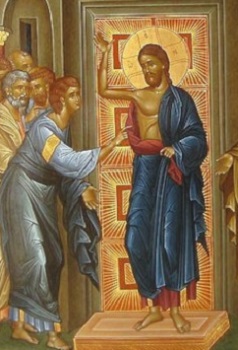
Now that we have festively celebrated that great and bright Sunday which is the holy and honourable day of the Resurrection and the saving victory of our Lord, offering the joyous sacrifice of praise with our voices, and having sung the hymns of triumph, and having forgiven each other everything, having spent this past week as if it were one day, one great feast; today we again renew the celebration of the Resurrection, this Sunday of Saint Thomas, also called "Antipascha" and "New Sunday" in the East, and "Low Sunday" in the West.
Today is both the eighth day and the first day; it is the eighth day from the most glorious Resurrection of Christ, and the first Lord's Day to follow it. Thus, it is an image of that age which is at once the first and the eighth, which will follow the ages of the present world, an image of the one never-ending day of the world to come. On the Sunday just past, Christ rose from the dead, while on the present Sunday we celebrate the future incorruption of every human creature.
Last Sunday pointed to the first coming of Christ and His glorious Resurrection, whereas this Sunday points to Christ's Second Coming. For at Christ's first appearance to the disciples, Saint Thomas, called the Twin, was not present, and thus did not believe. But at Christ's second appearance Saint Thomas, too, was present, and when he saw the marks of Christ's hands, his unbelief was changed into belief. As the Evangelist Saint John the Theologian says:
When it was late that same day, the first of the week, and the doors were shut, where the disciples were gathered together, for fear of the Jews, Jesus came and stood in the midst, and said to them: Peace be to you.
Christ appeared to the disciples when it was already evening. He waited for them all to gather together after they had dispersed for fear of the Jews. He appears all of a sudden, unexpectedly, and in a most wondrous manner, the doors being shut, and He stands in the midst of the disciples, in order to show that God has power to do whatever He wishes, and has power over all matter, all place, and all time. By Our Lord's sudden and most glorious entry through the closed doors He shows that He is God by nature and can do all things that He wishes to do. By baring the side of His body and showing the marks of the Nails, Christ made known to all that He had truly raised up the temple of His Body which had been hung on the Cross. And all the disciples saw Christ as He stood in their midst and bestowed upon them peace, complete calm, and passionlessness. Therefore, dear friends, if we also wish the Lord to come to us as He came to His apostles and disciples while the doors were shut, let us strive to close the doors – all our senses. Let us keep our mouths closed with a resolute good silence, because every idle word that men shall speak, they shall give account thereof in the day of judgment. Let us guard our eyes, that they might not gaze with passion or curiosity, but with chastity and reverence. Let us restrain our ears from listening to corrupt and detestable words; let us not allow our ears to pay heed to anyone who spreads calumny and slander, or blasphemy and falsehood. Let us keep our hands pure and undefiled, stretching them out to God in prayer and for acts of justice and kindness, and not for taking what belongs to others or for violence. Let us guide our feet into the way of peace, to carry out the divine commandments of Christ; let them not be bold and hasty to run to do evil.
And when He had said this, He shewed them His hands and His side. The disciples therefore were glad, when they saw the Lord.
Christ showed the disciples His hands, His feet, and His side, making known to them and assuring them – and us – that He was not some phantom, but truly a body which is visible, that He is truly the same One Who was crucified and died, and that He is risen as He foretold.
He said therefore to them again: Peace be to you.
Our Lord gives his disciples consolation in keeping with, and equal to, their struggle. He gives the disciples peace, on account of the battle they faced, which others would also face later in preaching the Word. He greets His disciples once more with the words, saying: Peace be to you, thereby laying down a kind of law for the children of the Church, even to our own day. Our Lord desires – commands - that we should be at peace with one another and with God; for this is the source and origin of everything good. There is nothing superior to, or sweeter than peace and genuine love; there is nothing more beneficial and beautiful than unity and oneness. For God Himself is love; so He is called, and so He is. And we have received the peace of God, which passes all understanding.
Then, as the Lord is consoling the disciples, He also emboldens them saying:
As the Father hath sent Me, I also send you.
Thus the disciples undertake the Lord's work with this mission, this sending forth. Just as our Lord did everything for the salvation of the human race, and finally willed even to suffer with us for our sake, destroying the bondage of death, so also it behooves those who are sent out to preach to traverse the entire earth diligently, to proclaim and announce the great good news to all men, and to labour and strive for this even unto death.
When He had said this, He breathed on them; and He said to them: Receive ye the Holy Ghost. Whose sins you shall forgive, they are forgiven them; and whose sins you shall retain, they are retained.
Immediately, the, our Lord also sanctifies his apostles and bestows upon them the Holy Spirit; with His visible act of breathing He disposes them to receive the Holy Spirit. He confers upon them power to forgive sins. After the Ascension, the Holy Spirit Himself descended and gave them all their powers and functions. In breathing upon them, Christ showed that He is the Creator of our nature. For, as Moses says, God formed the man of dust of the earth, and breathed upon his face the breath of life. Inasmuch as Adam through disobedience was brought down to death, having slipped and fallen from his former honour, Christ renewed him again; He did away with death by the Death of His Body, and returned man to his original dignity by breathing upon him.
Now Thomas, one of the twelve, who is called Didymus, was not with them when Jesus came. The other disciples therefore said to him: We have seen the Lord. But he said to them: Except I shall see in His hands the print of the nails, and put my finger into the place of the nails, and put my hand into His side, I will not believe.
Christ, the Master, had come, but Thomas, the servant, was not there. Now, speaking from history we know that Saint Thomas was not absent in vain, but that the mystery of the Lord's Resurrection might be revealed more surely and powerfully. If Thomas had been present with the others, he would not have doubted, and he would not have sought to touch Christ. If he had not touched Christ, he would not have arrived at such faith. If he had not become a believer himself, he could not have taught others to believe. Therefore, the disbelief of Thomas became an agent of our Faith.
And after eight days again His disciples were within, and Thomas with them. Jesus cometh, the doors being shut, and stood in the midst, and said: Peace be to you. Then He saith to Thomas: Put in thy finger hither, and see My hands; and bring hither thy hand, and put it into My side; and be not faithless, but believing.
Our Lord enters through closed doors, stands in the midst and gives the disciples peace. Then, bypassing all others, He approaches the doubting Thomas like a kind father who loves his children, desiring to make known to him His holy Resurrection from the dead. For the sake of one soul He shows Himself with the wounds he bore; He comes to save the one disbelieving disciple. He did not even wait for Saint Thomas himself to say anything, but rather offered immediately what Saint Thomas was seeking.
Thomas answered, and said to Him: My Lord, and my God. Jesus saith to him: Because thou hast seen Me, Thomas, thou hast believed: blessed are they that have not seen, and have believed.
When Saint Thomas heard the words of the Lord and touched Him, he was filled with the Holy Spirit and with joy. He reversed his unbelief, rejected his doubting thoughts, repelled despondency, and cried out, confessing Jesus Christ to be Lord and God.
To teach us that true faith consists in accepting things unseen with belief, the Lord said: Blessed are they that have not seen, and yet have believed. It is not only the disciples whom Christ calls blessed here, but also all who will believe in times to come. Though it is written: Blessed are the eyes which have seen the Lord, He shows that it is even more blessed to believe without seeing, and that those who have not seen will not be any poorer that those who have seen.
Many other signs also did Jesus in the sight of His disciples, which are not written in this book. But these are written, that you may believe that Jesus is the Christ, the Son of God: and that believing, you may have life in His name.
John the Evangelist and Theologian speaks of fewer signs than the other apostles in his writings, but he had recounted that which was sufficient to lead his hearers to believe. One who does not believe what has already been said will not accept or believe the many other thing that could be said; while one who accepts these things will not require anything else in order to convince him.
Therefore let us consecrate ourselves this day, let us come back to our senses and be renewed. Christ died and rose again that we might not die through sin, but might walk in newness of life, glorifying and thanking Christ our true Lord and God, Who orders all things for our welfare, and to Whom be glory and dominion, together with His unoriginate Father, and the Most Holy Spirit, now and ever, and unto the ages of ages. Amen!

The Funny Pharmacy
A joyful mind maketh age flourishing: a sorrowful spirit drieth up the bones. - Proverbs 17:22

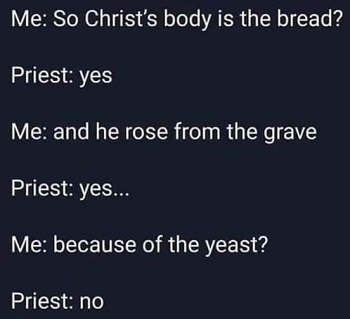


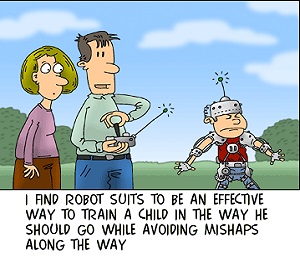

Frequently Asked Questions

What would you say proves your papal claimant as Pope of the Universal Church as valid?
The Catholic Church teaches that a heretic cannot become Pope any more than an unbaptized person or a woman. This is stated in the Papal Bull, Cum Ex Apostolatus Officio of Pope Paul IV in paragraph 6.
Diocesan Bishops as the Ecclesia Docens (Teaching Church) are held to a higher level in regard to doctrine. It is their duty to see to it that everything taught in their diocese is true Catholic doctrine. Canon Law gives them the right and duty to judge matters of heresy in their own diocese and to absolve from the excommunication for heresy. Therefore they are required to know Catholic teaching. If they commit the crime of heresy, they are presumed to have done so willingly. Therefore they are presumed to incur all of the penalties attached to heresy.
Heretics resign all offices they may hold in the Church and Canon Law accepts their resignation without need of any declaration on the part of a superior.
The Second Vatican Council taught heresy in several documents, including but not limited to the Decree on the Liturgy, the Decree on Ecumenism and the Decree on the Relation of the Church to Non-Christian Religions.
All but four bishops present voted for the Decree on the Liturgy. Also, unless they state otherwise, all of the bishops present are presumed to have signed all of the decrees of Vatican II. Such is an act of notorious public heresy. Therefore by the end of Vatican II, every bishop present had resigned his office by the commission of public heresy, including the Bishop of Rome, John the Baptist Montini, who had taken the name of Paul VI.
And thus, by the end of Vatican II there was only one Cardinal left, Cardinal Mindszenty, and no Pope. With the Papacy vacant, the Church needed a Pope. Mindszenty died in 1975, therefore the Church had no Cardinals to elect a Pope.
When the Church is without Cardinals, theologians and canonists teach that she must supply herself with a Pope in an extraordinary manner. This they teach is a matter of the Natural Law, since a perfect society always has the ability to supply itself with a ruler. The Church is a perfect society, so it is always possible to elect a Pope, here and now.
The first principle is that the first elected has the Papacy. This is known as first in time, first in right. Also nothing invalidates the election of a Pope, except the election of someone not qualified by Divine Law. Divine Law holds that the unbaptized, women and heretics cannot be elected as Pope. Ecclesiastical Law cannot regulate who may be elected Pope. Every attempt to issue such a law has been set aside by the election of someone not qualified. One such attempt was to limit election to the Cardinals. The electors set this aside by electing someone who was not a Cardinal. Fraud and even simony do not render an election of a Pope invalid.
A reasonable attempt must be made to summon the electors after an office becomes vacant. Those who appear on the day appointed are the electors. Even the absence of a majority of qualified electors does not render an election invalid as history proves.
Beginning in the early 1970's both the fact of the vacancy of the papacy and the necessity of electing a Pope was discussed by Catholics. On July 16, 1990 a group of Catholics assembled and elected David Bawden as Pope, who took the name of Pope Michael. This group made every effort possible to notify all those who might be qualified, including contacting each and every chapel listed as sedevacantist, meaning that they believed the papacy was vacant.
For answers to more frequently asked questions, click here: https://www.vaticaninexile.com/frequently_asked_questions.php
The Pope Speaks: April 2021
They Can't Do This to Me

We have a common attitude in our own hearts: "They can't do this to ME." Actually they can do a lot of things to us, but they may not. Before we get to the root cause of this problem, we need to define a few terms, because understanding what words truly means is important to communication.
Can means to be able to, while cannot means not to be able to. Just because I can do something, does not mean I should do something. I can murder someone, but reading the commandment tells me I may not kill someone. May means that what we are doing is not a sin or against the law, which may apply.
Often when we say that someone cannot do something, we actually mean that they may not do something, although they are certainly able. When we misuse words, we miscommunicate and in fact are lying. We usually do not realize that we are lying. What we need to understand are basic principles and then to apply them. When we understand these simple but important distinctions, then we will be able to understand what is going on.
There are certain restrictions, which prevent us from doing something. Most people cannot pick up a hundred pounds, which means they physically are not able to. However, all of us who can drive are able to run a red light. However, we may not run a red light, because a red light means stop and other drivers expect us to stop. The consequences of running a red light could be deadly to others as well as to us. If someone runs a red light, we might say they can't do that, but they certainly are able to, because they just did. However, they may not do that and it is wrong and a sin to run a red light.
In our lives there are many restrictions placed upon all of us about what we may and may not do. For instance we may not drive a car while we are intoxicated, but we may be able to. Such a restriction is called a law. A law is an ordinance of right reason, promulgated by lawful authority for the common good. Keeping drunk drivers off of the roads is certainly a good thing, because they are a danger to themselves and others.
When we say someone may not do something, we mean there is some restriction that says they should not do this. If they go ahead and do what they should not, then we are saying they are exceeding what is permitted them. For instance, if an authority in government issues a law which they may not, then we are saying they are exceeding their authority. However, even in these cases should we go ahead and observe the law?
An idea was born two and a half centuries ago that the people are sovereign and the source of authority. This led to such things as the United States Constitution, which is based upon the principle of limiting authority so that it does not become tyrannical. In theory it sounds good, but does it work in practice? The Constitution has what are called checks and balances where the three branches of government have restrictions built in to prevent them from exceeding their authority and enabling each branch to be held in check by the other two.
The problem is that the Constitution is based on a false principle that people are sovereign and a source of authority. The people are not sovereign and the source of authority. Actually that principle leads to atheism, because without God the only remaining source of authority is the people. If one reads the US Constitution there is no mention of God in it. The only mention of religion is in the First Amendment, which forbids the Federal Government from restriction the free exercise of religion.
"By me kings reign, and lawgivers decree just things, By me princes rule, and the mighty decree justice. " [Proverbs 8:15-16] All authority comes from Almighty God. When we realize the true principle of authority, then we also realize that the only one who can keep authority in check is Almighty God.
Any human attempt to restrict authority is bound to fail, because it relies on the cooperation of people who are often tempted to go beyond their authority if they can. Also people can work together and make the checks and balances literally go away. Saint Paul tells Titus (3:1): "Admonish them to be subject to princes and powers, to obey at a word, to be ready to every good work." [Titus 3:1]
The question arises, what should we do when our authorities exceed their authority? The first point is that it is not the duty of subjects to judge their authority. And this is when the objection comes us: "They can't do this." Actually because they are exceeding their authority, we know they can. It is true, that they may not do it, because they are not permitted to exceed their authority.
Many false principles began to circulate in response to abuse of authority, which have been used by both the left and the right. These principles are based on the concept of rights, which was also born two and a half centuries ago. The Declaration of Independence declared: "We hold these truths to be self-evident, that all men are created equal, that they are endowed by their Creator with certain unalienable Rights, that among these are Life, Liberty and the pursuit of Happiness." And so the idea of rights has been impressed upon us. If I have a right, everyone else has the corresponding duty not to infringe upon my right. That is with a right comes a corresponding duty. Let us consider that if someone else has a right then I have a duty to respect and not infringe upon that right.
The right to liberty has always been infringed upon in certain cases. When someone is sent to jail, his liberty is certainly restricted. In fact the right to life is infringed upon in the case of capital punishment.
As for the right to pursue happiness, do we truly have that right under the Law of God? First of all this alleged right makes happiness an end rather than a means. True our end is eternal happiness, but this is not what the Declaration of Independence says. There is no qualification on happiness. Happiness is described as pleasure or contentment, which is a by produce of doing the will of God, although there is pleasure attached to certain sins. Certainly we have no right to sin, although this is implied in this statement without qualification. And we do not have a right to eternal happiness, because that implies that God has a duty to give it to us. God has set conditions in order to obtain eternal happiness.
We have seen two false principles have been ingrained in people's thinking; false principles which have led us to reach false conclusions. False thinking naturally leads to false conclusions. What we need to do is to learn how to think like God would have us think. "For my thoughts are not your thoughts: nor your ways my ways, saith the Lord." [Isaias (Isaiah) 55:8] How do I convert my thoughts to Lord's thoughts? We do this by spending much time with the Lord. It is only by spending time with someone that we can learn what and how they think.
We have dispelled the first false principle that authority or power comes from the people. The second we need to consider further is that of rights. Scripture, which is God's thinking, focuses on our duties, not our rights. And this is where our focus should be. Even the 1917 Code of Canon Law focuses on duty rather than rights. In fact, the word right appears in only two Canons:
Canon 682: "The laity has the right to receive from the clergy the spiritual goods and especially the necessary means of salvation, according to the rules of ecclesiastical discipline."
Canon 1111: "Both married parties possess from the moment of the marriage contract has been concluded equal rights and duties concerning the actions proper to conjugal life."
Canon 1111 is based upon the Law of God. Canon 682 is restricted.
The question arises, don't some in the Church such as the Pope have certain rights? Actually these rights are considered under the term privilege. And yes, certain authorities in the Church have privileges. The clergy are only required to exercise their privileges, if it is necessary for the good of another or for the common good. Of course, some privileges are inherent in certain offices in the Church, because they are necessary for the proper exercise of the office. Others are personal and may be set aside, unless needed for the good of another or of others.
When we start thinking privileges rather than rights, we are humbled. A privilege is given for some reason, whereas we consider a right just that, a right that is OWED to us for some reason. The focus was shifted from duty to rights almost two and a half centuries ago. We have the Declaration of the Rights of Man with the French Revolution. We have the Bill of Rights. Our focus has been shifted and we need to shift back and remember who truly has rights. God has rights and any privilege we may have ultimately comes from God and is given to us for some reason.
And this brings us back to the proposition: "They can't do this to me." This is actually a statement of pride. We are implying they are forbidden to infringe upon ME. We are making ourselves sovereign as we first proposed two and a half centuries ago. God is sovereign and God has inalienable rights, which places corresponding duties on us.


Saint Mark the Ascetic
On The Spiritual Law

91. The enemy, understanding how the justice of the spiritual law is applied, seeks only the assent of our mind.
Having secured this, he will either oblige us to undergo the labors of repentance or, if we do not repent, will torment us with misfortunes beyond our control. Sometimes he encourages us to resist these misfortunes so as to increase our torment, and then, at our death, he will point to this impatient resistance as proof of our lack of faith.
92. Many have fought in various ways against circumstances; but without prayer and repentance no one has escaped evil.
93. Evils reinforce each other; so do virtues, thus encouraging us to still greater efforts.
94. The devil belittles small sins; otherwise he cannot lead us into greater ones.
95. Praise from others engenders sinful desire, while their condemnation of vice, if not only heard but accepted, engenders self-restraint.
96. A self-indulgent monk has achieved nothing through his renunciation. For what he once did through possessions he still does though possessing nothing.
97. Moreover, the self-controlled man, if he clings to possessions, is a brother in spirit of this kind of monk; because they both feel inward enjoyment they have the same mother - though not the same father, since each has a different passion.
98. Sometimes a man cuts off a passion in order to indulge himself more fully, and he is praised by those unaware of his aim. He may even be unaware of it himself, and so his action is self-defeating.
99. All vice is caused by self-esteem and sensual pleasure; you cannot overcome passion without hating them.
100. 'Avarice is the root of all evil' (1 Tim. 6:10); but avarice is clearly a product of these two components.
Saints from East and West
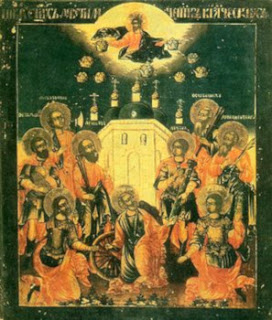
29 April - The Nine Holy Martyrs of Cyzice.
The city of Cyzice is located in Asia Minor at the coast of the Dardenelles (Hellespont) Straits. Christianity there began to spread about already during the time of the preaching of the Apostle Paul. But under the times of persecutions by the pagans events came to this - that some of the Christians fled the city, while others kept their faith in Christ in secret. Therefore by the time of the end of the third century Cyzice was still basically a pagan city, although there was also a Christian church there. The situation in the city distressed true Christians, who sought to uphold the Christian faith. From there were also the Nine holy Martyrs: Theognides, Ruphos, Antipater, Theostikhos, Artemon, Magnos, Theodotos, Thaumasios, and Philemon. They hailed from various places, and were of different ages: both the young like Saint Antipater, and the very old like Saint Ruphos, and they came from various positions in society: among them were soldiers, countryfolk and city-people, and clergy. But all of them declared their faith in Christ and were all the more intense in their yearning for the spread and strengthening of the True Faith.
Having shown up in the city of Cyzice, the saints boldly confessed Christ and fearlessly denounced the pagan impiety. They were arrested and brought to trial before the city governor. Over the course of several days they were tortured, locked up in prison and again led out from it, and promised their freedom for a renunciation of Christ. But the valiant martyrs of Christ continued to glorify the Name of Christ. All nine martyrs were beheaded by the sword (+ c.284-292), and their bodies buried nearby the city.
In the year 324, when the Eastern half of the Roman empire came under the rule of Saint Constantine the Great, and the persecutions against Christians ended, the Cyzice Christians removed the undecayed bodies of the nine martyrs from the ground and placed them in a church, built in their honour.
Various miracles occurred from the holy relics: the sick were healed, and the mentally aberrant brought to their senses. The faith of Christ grew within the city through the intercession of the holy martyrs, and many of the pagans were converted to Christianity.
When Julian the Apostate (361-363) came to rule, the pagans of Cyzice turned to him with a complaint against the Christians for the destruction of pagan temples. Julian gave orders to rebuild the pagan temples and to lock up in prison bishop Eleusios. Bishop Eleusios was set free after the death of Julian, and the light of the Christian faith shined anew through the assistance of the holy martyrs.
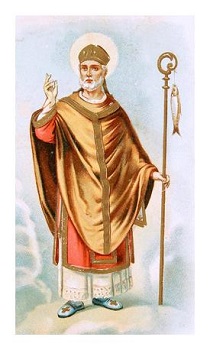
12 April - Saint Zeno, Bishop of Verona.
In the Dialogues of Saint Gregory and in several martyrologies Saint Zeno, bishop of Verona, is styled a martyr, but Saint Ambrose, who was his contemporary, in a letter addressed to his successor Syagrius speaks of his happy death. Furthermore, in an ancient missal of Verona, Saint Zeno is honoured only as a confessor. Living as he did in the days of Constantius, Julian, and Valens, he may well have merited the title of martyr by suffering in the persecutions they waged, even if he did not die a violent death.
From a panegyric he delivered on Saint Arcadius, a Mauretanian martyr, it has been conjectured that Saint Zeno was born in Africa; and from the excellent flowing Latin of his writings and from the quotations he makes from Virgil, it is evident that he received a good classical education. He seems to have been made hishop of Verona in 362. We gather a number of interesting particulars about him and about his people from a collection of his tractatus, short familiar discourses delivered to his flock. We learn that he baptized every year a great number of pagans, and that he exerted himself with zeal and success against the Arians, who had been emboldened by the favours they had enjoyed under the Emperor Constantius. When he had in a great measure purged the church of Verona from heresy and heathenism, his flock increased to an extent which necessitated the building of a large basilica. Contributions flowed in freely from the citizens, whose habitual liberality had become so great that their houses were ahvays open to poor strangers, whilst none of their fellow citizens ever had occasion to apply for relief, so promptly were their wants forestalled. Their bishop congratulated them upon thus laying up for themselves treasure in Heaven. After the battle of Adrianople in 378, when the Goths defeated Valens with terrible slaughter, the barbarians made numerous captives in the neighbouring provinces of Illyricum and Thrace. It appears to have been on this occasion that, through the bountiful charity of the inhabitants of Verona, many of the prisoners were ransomed from slavery, some rescued from a cruel death, and others freed from hard labour. Though this probably occurred after the death of Saint Zeno, the self-sacrifice of the townsmen may be traced to his inspiring zeal and example.
Saint Zeno himself always chose to live in great poverty. He often speaks of the clergy he trained and of the priests, his fellow-labourers, to whom offerings were allotted at Easter. He alludes to the ordinations he performed at the paschal season, as well as to the solemn reconciliation of penitents, which also took place in Holy Week.
Saint Ambrose makes mention of virgins, living in Verona in their own houses and wearing the veil, who had been consecrated to God by Saint Zeno, as well as of others who dwelt in a convent of which he was both the founder and the director. This was before Saint Ambrose had established anything of the kind in Milan.
Saint Zeno inveighed against the abuses of the agape or love-feast, which had become a scandal, and also against the practice of interrupting funeral Masses by loud lamentations. Many of the customs of the period are recorded in these discourses. It would appear to have been still usual, at any rate in Verona, to immerse the whole body at baptism, the water being warmed for the purpose, and Saint Zeno is the only writer to allude to the habit of giving medals to the newly baptized.
Saint Gregory the Great describes a remarkable miracle which occurred two centuries after Saint Zeno's death, related to him by John the Patrician, who was an eye-witness of it. In the year 598 the river Adige threatened to submerge Verona. The people flocked to the church of their holy bishop and patron, Zeno. The waters seemed to respect the building for, although they rose outside as high as the windows, they never penetrated into the church but stood like a solid wall. The people remained within in prayer until, after twenty-four hours, the waters once more subsided. This miracle and others greatly increased the general devotion to the saint, and in the reign of King Pepin, Charlemagne's son, a new church was built to contain his relics, which are still preserved there in a subterranean chapel. Saint Zeno is usually represented with a fishing-rod, from the end of which a fish is hanging. The emblem is accounted for locally by the tradition that the saint was fond of fishing in the Adige, but the fish may possibly be symbolical of baptism.


Books to feed your faith!
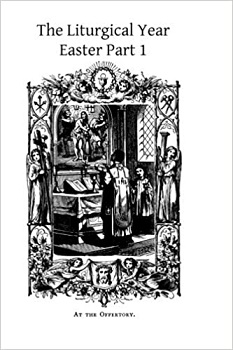
The Liturgical Year: Easter Part 1 (Volume 7)
$16.95
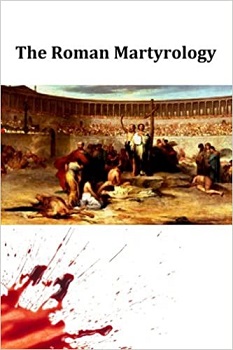 The Roman Martyrology
The Roman Martyrology
$19.95
Will the Real Catholic Church Stand Up?
Kindle $2.99 / Paperback $9.95
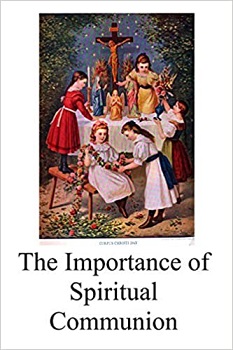
The Importance of Spiritual Communion
Kindle $2.99 / Paperback $5.99
If we cannot receive Holy Communion actually, then let us do so spiritually. These prayers and instructions have been gathered from the Saints and other venerated spiritual writers. Spiritual Communion has been a part of the spiritual life for decades. Growing up I was instructed to make a Spiritual Communion, when I could not go to Communion such as when I assisted at a second Mass. The same is true if one finds oneself at Mass, but not fasting. There are times coming, when it will be difficult, if not impossible to assist at the Holy Sacrifice of the Mass. We should be prepared for such times.
For More Good Traditional Catholic Books:

Paschal Meat Pie

Prep: 45 mins
Cook: 1 hr
Total: 1 hr 45 mins
Servings: 12
Yield: 2 - 9 inch pies
Ingredients
4 (9 inch) unbaked pie crusts
2 pounds ricotta cheese
6 eggs
8 ounces mozzarella cheese, grated
1 pound cooked ham, chopped
½ pound Genoa salami, chopped
¼ pound prosciutto, chopped
¼ cup grated Parmesan cheese
Directions
1. Preheat oven to 325 degrees F (165 degrees C).
2. Place ricotta in a large mixing bowl and add eggs one at a time while mixing on low speed. Stir in mozzarella, ham, salami, and prosciutto until all ingredients are well combined. Line two 9 inch pans with pastry. Spoon half of mixture into each pan. Sprinkle half of the Parmesan cheese over each pie, then cover with top pastry. Crimp edges and cut steam vents in tops.
3. Bake in preheated oven for 1 hour, until crust is golden brown. Cool on racks.
Lisa's Own Lemon Bars

Ingredients
2 ¼ cups all-purpose flour
½ cup confectioners' sugar
1 cup butter, softened
4 eggs
1 ½ cups white sugar
½ cup lemon juice
1 tablespoon lemon zest
Directions
1. Preheat oven to 350 degrees F (175 degrees C).
2. Mix 2 cups of flour and confectioner's sugar together. Cut in the butter or margarine. Mix well until the dough resembles pie dough consistency. Press the dough into a 9x13 inch baking pan.
3. Bake 15 to 20 minutes or until golden brown.
4. Beat together eggs, sugar, 4 tablespoons flour, lemon juice and lemon rind for at least 1 minute. Pour the mixture over the baked crust.
5. Bake the bars another 20 minutes, or until the lemon topping has set. Sprinkle with confectioner's sugar when cooled.
Video sermons and instructions: Timeless timely truths for living the Faith
Low Sunday (2011)
One Flock (2013)
Go and Sin No Less
A Catechism story: St. Cecilia

Encouragement for Today
Therefore encourage one another and build one another up.... I Thessalonians 5:11
We believe that through our assorted podcasts, Vlogs, audio downloads and devotional blogs, you will find an assorted Treasure Chest of...
- Sermons
- Classic Catholic Audio Books.
- Devotionals
- Scripture Studies
- Catechism Lessons
- Old-Time Christian radio programs
- Catholic Videos
...that will be a help in your faithful walk with the Lord.
LEARN MORE AT THE ENCOURAGEMENT FOR TODAY WEBSITE: https://www.encouragementfortoday.com
Salty Enough for the Bible
“Let your speech be always in grace seasoned with salt: that you may know how you ought to answer every man.”
- Colossians 4:6.

How much salt should there be in the ocean? We know how much salt rivers carry into the sea each year. And we know how much salt is already in the ocean. So the question is: How long has salt been building up in the ocean?
This topic was the subject of an impressive paper presented at the Second International Conference on Creationism in 1990 in Pittsburgh. The research was presented by Dr. Steven A. Austin and Dr. D. Russell Humphreys, scientists who believe in creation. Even some of the evolutionists attending the conference admitted that the paper raised some challenges to evolutionary claims about the age of the oceans.
This new research carefully looked at all the sources that put salt into the ocean and all the processes that remove salt from the ocean. Evolutionists say that salt is being added to the oceans at about the same rate as it is being removed. If this were not the case, the oceans could not possibly be billions of years old. However, creation scientists Austin and Humphreys showed that salt is being added to the ocean and probably has been in the past. In fact, the oceans could not possibly be even one-fiftieth of the age claimed by evolutionists. Their conclusions also called radioactive dating methods into question.
We don’t need to know any science to know that the truth will never contradict the Bible. However, we should also know that scientists who believe in creation can offer impressive scientific challenges to the claims of evolutionary science.
Catechism Catch-Up
Our Father
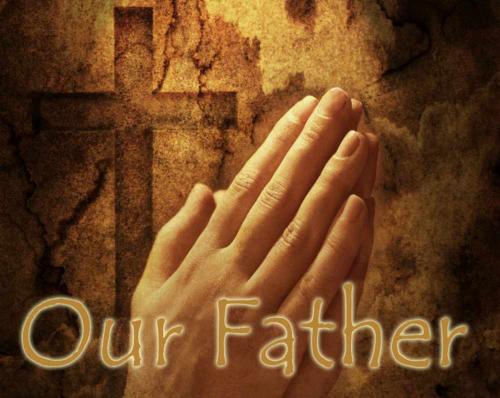
Finding Security In God As A Father
In this study we want to consider the reason why so many people feel insecure, the problems that arise out of insecurity and the solutions for the same.
When Jesus was leaving the world, on the night before He was crucified, He told his disciples, "I will not leave you orphans; I will come to you" (John 14:18). What is an orphan? An orphan is one who has no father and mother. There is a lot of difference between a child, who has grown up in a home experiencing the love of a father and a mother, and a child who has had no father and mother. That means the father and mother died when the child was small so that child had to be brought up by stepmother or stepfather, or uncle or aunt, or grandparents or, sometimes, in an orphanage. Orphans tend to be insecure because they have not experienced love in their childhood, the love that only a father and mother can give, no uncle or auntie, or grandmother or an orphanage can ever give.
And when there is this type of insecurity due to the lack of love, orphans tend to be very defensive. They tend to feel that the world is against them, that people are against them, and that they must defend themselves. They become introverted, depressed, discouraged, and jealous of others who have more than them. They become very possessive in friendships because of insecurity. They want somebody to love only them and nobody else. We should not judge orphans who are like this. They can remain the same even when they are 40 or 50 years old, because, way back in childhood, they never experienced the love of a father or mother. Those of us, who have parents, sometimes don't appreciate the value of having them. That is unfortunate! Some children, probably don't appreciate the value of their parents sufficiently. They need to thank God for there father and mother, because there are many children in the world who do not have a father and mother.
I want to apply this spiritually. What did Jesus mean when he said, 'I will not leave you orphans?' Spiritually speaking, we can say that the world is full of orphans, because they don't have a Father; they don't have God as a Father. They don't know God as a Father. So, all the characteristics that you find in ordinary physical orphans, you find in these spiritual orphans. The world is full of people who are insecure; who feel that others are against them. So they fight, they defend themselves, they are very possessive. It is like that because they are spiritually orphans. They love money because they are insecure. They have no heavenly Father. They are anxious. They are worried.
Jesus sought so much, during His earthly ministry, to impress upon His disciples the fact that God was a loving Father. He taught them to pray, "Our Father." No person in the Old Testament could ever pray like that. He said, 'When you pray, say, "Our Father,"' and after His resurrection, He said, 'My Father is your Father.' There is a beautiful verse in John 1:18 "No man hath seen God at any time: the only begotten Son who is in the bosom of the Father, he hath declared him." In other words, Jesus, by His life and His teaching, has explained to us what God is like.
You know, the world is full of people who have never seen God. None of us have seen God. That is what it says in that verse. When we have not seen God, it is like a man who has never seen an elephant. Supposing you were to go to some country, where there is some child who has, maybe, seen pictures of lions and tigers, but has never seen an elephant or a picture of one. If you ask that child to draw a picture of an elephant, what do you think that elephant would look like? Do you think any child in the world will ever think of drawing a long nose, which we call a trunk? No, because there is no other animal that has it. They will draw something that looks like a lion or a dog, or like most animals with four legs, but nobody will be able to draw an elephant, if he has not seen an elephant or a picture of one. How can you imagine one?
If it is so with some created animal like this, which we cannot draw a correct picture of, can you draw a correct picture of God? No, your picture will definitely be wrong. We have so many people who have given their own opinions about God. And what is the result? Today we have so many religions, each with their own ideas of what God is like. It is like two hundred people who have never seen an elephant or a picture of one, trying to draw an elephant. Who is right? Every one of them is wrong. But the man who has seen an elephant, he will be able to draw a correct one. When Jesus came from heaven, He was the only person who could tell us what God is like.
Most people's idea of God is that of a very strict person, like a policeman, who is out to catch you for some small mistake you do.
Like a policeman who waits around a blind corner to see if you have made some traffic violation or broken some traffic law. They think God is like that; just waiting and hiding on the corner, to pounce on you as soon you make some mistake. So, most people live in the wrong type of fear of God. They are afraid that God will punish them or harm them. In every religion, there are preachers and teachers, and priests who capitalize on this fear that people have. They say that you have to please this god in some way or the other, otherwise he will punish you. In almost every religion, including the Christian religion, priests and preachers say that the way to please God is by giving Him money.
So, people give money. They go on long pilgrimages, here and there, and give hundreds of thousands of dollars. A lot of this money goes into the pockets of these priests and preachers and pastors. It is all to capitalize on the weakness of orphan-like people, knowing that they have some type of guilt feeling or fear, and making them give their money. It is a great deception. Jesus came to remove this concept of God from people all together. He said God is a loving Father. God is interested in you, and not in your money. He is interested in helping you.
Which father is always trying to get money out of his small children? A father is always trying to help his children; feed them, clothe them, educate them, spend so much money on them, and get nothing in return. Jesus revealed God as a Father. When you feel that God is like a managing director, living up there in the top floor of some factory, whom you never see, well, you have got the wrong concept of God. And you are an orphan. The result is that there is a lot of insecurity, anxiety, fear, tension in your life, which you need not have.
Jesus said look at the birds of the air, who feeds them? They don't have a barn, they don't have a storehouse, and yet how many dead birds, due to hunger, do you see on the road? You hardly can find one dead bird on the road. It is very rarely that you find a dead bird on the road. How is that? How is it they don't all starve to death? Are there lots of people throwing seeds for the birds every day? No, they find it; somehow our Heavenly Father feeds them. They are not worried. And Jesus said, 'better are you than many sparrows.'.
You know, when we are anxious and worried it makes us irritable.
It makes us tense; it makes us hit back at people who we suspect are hitting at us. The person who is secure in God is never disturbed by whatever people say. Supposing you are walking down the road, and a dog keeps on barking from inside a locked gate, or even barking from the other side of the road, what are you going to do? Are you going to argue with that dog? Are you going fight with that dog asking, 'Why do you bark at me?' It is as foolish when you go and start arguing with somebody who is accusing you, calling you names, or telling false stories about you.
What should you do? What do you do when you see a barking dog on the other side of the road? Just leave him alone. But if you are insecure and you are like an orphan you won't be able to do that. You will be tense, you will be worried and you will just go and fight with that dog. That is how many people fight and argue with people who are calling them bad names. Somebody writes a bad letter to them, they write one back to them. This is all the result of insecurity. But how was it with Jesus, when people called Him the prince of devils? He just left them alone. They accused him. They said all types of stories about him, He just left them alone, it did not bother Him one bit.
So the most important thing for us is to know God as a Father. He is not a policeman. He loves you. He cares for you. He knows every detail of your life. If you have put your trust in Jesus Christ, and have been sacramentally baptized, God has become your Father. Ask God to give you that assurance that He is your Father who cares for you. It will make all the difference in your life.
READ MORE FROM THE TRADITIONAL CATECHISM AT THE WEBSITE: https://www.traditionalcatechism.com
Living Catholic:
What Does It Mean To Cry Out To God?
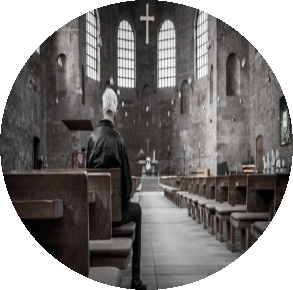
The Power of Crying Out: Relying on God in desperate times
Throughout history, believers have cried out to God in times of distress. Sometimes after years of praying, a single cry brings direction or deliverance instantly. Many have wondered why there are such powerful results from simply crying out to God, yet the promise is clear: “Call upon me in the day of trouble: I will deliver thee, and thou shalt glorify me.” (Psalm 50:15). Throughout Scripture, believers are instructed to cry out to God in times of trouble. Here are a few examples: “Call upon me in the day of trouble: I will deliver thee, and thou shalt glorify me.” (Psalm 50:15). “Cry to me and I will hear thee: and I will shew thee great things, and sure things which thou knowest not.” (Jeremiah 33:3). (Although not a command this next verse shows what God does when we cry out to Him.) “The just cried, and the Lord heard them: and delivered them out of all their troubles.” (Psalm 34:17). “When I cry unto thee, Then shall my enemies be turned back. In what day soever I shall call upon thee, behold I know thou art my God.” (Psalm 56:9).
Crying Out in Scripture
The following Hebrew and Greek words, their definitions, and the descriptions of how they are used in Scripture gives a clear picture of what it means to cry out.
- A cry of deep distress: zaaq (Hebrew) God
“And thou sawest the affliction of our fathers in Egypt: and thou didst hear their cry [zaaq] by the Red sea . . . and . . . didst divide the sea before them, and they passed through the midst of the sea on dry land” (Nehemiah 9:9–11).
- To cry out for help: tsaaq (Hebrew)
When the Israelites could not find fresh water in the wilderness, Moses “cried [tsaaq] to the Lord, and he shewed him a tree, which when he had cast into the waters, they were turned into sweetness.” (Exodus 15:25).
- To call with a loud sound: qara (Hebrew)
“Jabez called [qara] upon the God of Israel, saying: If blessing thou wilt bless me . . . . And God granted him the things he prayed for.” (I Chronicles 4:10).
- To shout a war cry: ruwa (Hebrew)
“And all the men of Juda shouted [ruwa]: and behold when they shouted, God terrified Jeroboam, and all Israel that stood against Abia and Juda.” (II Chronicles 13:15).
- A cry for help: shavah (Hebrew)
“He will do the will of them that fear him: and he will hear their prayer [shavah], and save them.” (Psalm 145:19).
- A cry of deep distress: tsaaqah (Hebrew)
“. . . he hath not forgotten the cry [tsaaqah] of the humble” (Psalm 9:12).
- To cry out: krazo (Greek)
When the Apostle Peter walked out on the water at the invitation of Jesus, Peter was “afraid: and when he began to sink, he cried out [krazo], saying: Lord, save me. And immediately Jesus stretching forth his hand took hold of him” (Matthew 14:30–31).
- To implore with strong voice: boao (Greek)
A blind man in Jericho heard that Jesus was passing near him. “And he cried out [boao], saying: Jesus, son of David, have mercy on me. . . . And Jesus said to him: Receive thy sight: thy faith hath made thee whole.” (Luke 18:38–42).
Characteristics of a Cry
Crying out to God is an act of desperation and total concentration. It is a fervent expression of faith in God and trust in His goodness and power to act on your behalf. Crying out to God expresses the following traits:
- Genuine humility
It is hard for people to admit that they cannot solve a problem or overcome an obstacle, but it is true that we need God’s help. He delights in a broken and contrite heart that humbly seeks His aid. “. . . he hath not forgotten the cry of the humble.” (Psalm 9:12; see also Psalm 10:17).
- Unconditional surrender
When a situation becomes so desperate that only God can deliver you, a cry represents total, unconditional surrender. Don’t try to bargain with God—leave your life in His hands. “If I regard iniquity in my heart, the Lord will not hear me” (Psalm 66:18).
- A plea for mercy
Apart from Christ, we have no value that merits God’s favor. When driven to a point of despair or destruction, your unworthiness before God often becomes more apparent, and it can motivate you to cry out to Him for mercy. “The mercies of the Lord that we are not consumed: because his compassions have not failed. They are new every morning: great is thy faithfulness” (Lamentations 3:22–23).
- Personal helplessness
Do you tend to believe that you need God’s help with only the really hard things? Remember, Jesus said, “Without me ye can do nothing” (John 15:5).
- Faith in God’s power and resources
Your cry to God acknowledges God’s ability to do what no one else can do. During the storm on the Sea of Galilee, the disciples acknowledged Jesus’ power to rescue them when they cried out, “Lord, save us: we perish” (Matthew 8:25.)
- Desperation
Crying out to God is an admission of one’s need for God. The psalmist declared, “In my affliction I called upon the Lord, and I cried to my God: And he heard my voice from his holy temple: and my cry before him came into his ears.” (Psalm 18:6).
Examples of God’s Response to Crying Out
The Bible is filled with examples of times when God answered the cries of His people. Below are a few examples of occasions on which individuals cried out to God and God heard their cries and delivered them:
- Elijah cried out, and God revived a dead child:
“ And he cried to the Lord, and said: O Lord my God, hast thou afflicted also the widow, with whom I sojourn, so as to kill her son? And he stretched, and measured himself upon the child three times, and cried to the Lord, and said: O Lord my God, let the soul of this child, I beseech thee, return into his body. And the Lord heard the voice of Elias: and the soul of the child returned into him, and he revived.” (I Kings 17:20–22).
- Jehoshaphat cried out, and God delivered him from death:
“So when the captains of the cavalry saw Josaphat, they said: This is the king of Israel. And they surrounded him to attack him: but he cried to the Lord, and he helped him, and turned them away from him.” (II Chronicles 18:31).
- Hezekiah cried out, and God gave him victory:
“Hezekiah the king, and the prophet Isaiah the son of Amoz, prayed against this blasphemy, and cried out to heaven. And the Lord sent an angel who cut off all the stout men and the warriors, and the captains of the army of the king of the Assyrians: and he returned with disgrace into his own country. And when he was come into the house of his god, his sons that came out of his bowels, slew him with the sword.” (II Chronicles 32:20–21).
- Jesus’ disciples cried out to Him in a storm, and Jesus calmed the sea:
“And when they were sailing, he slept; and there came down a storm of wind upon the lake, and they were filled, and were in danger. And they came and awaked him, saying: Master, we perish. But he arising, rebuked the wind and the rage of the water; and it ceased, and there was a calm.” (Luke 8:23–24).
- Blind Bartimaeus called to Jesus, and He restored his sight:
“And they came to Jericho: and as he went out of Jericho, with his disciples, and a very great multitude, Bartimeus the blind man, the son of Timeus, sat by the way side begging. Who when he had heard, that it was Jesus of Nazareth, began to cry out, and to say: 'Jesus son of David, have mercy on me.’ And many rebuked him, that he might hold his peace; but he cried a great deal the more: 'Son of David, have mercy on me.’ And Jesus, standing still, commanded him to be called. And they call the blind man, saying to him: 'Be of better comfort: arise, he calleth thee.' Who casting off his garment leaped up, and came to him. And Jesus answering, said to him: 'What wilt thou that I should do to thee?' And the blind man said to him: Rabboni, 'that I may see.' And Jesus said to him, 'Go thy way, thy faith hath made thee whole.' And immediately he saw, and followed him in the way.” (See Mark 10:46).
An Invitation From the Living God
Psalm 50:15 declares this Word from the Lord: “Call upon me in the day of trouble: I will deliver thee, and thou shalt glorify me.” As children of the living God, our heavenly Father appeals to us to cry out to Him for deliverance. Let us be quick to cry out to Him with humility, sincerity, and faith. God “will do the will of them that fear him: and he will hear their prayer, and save them.” (Psalm 145:19).
To Learn More Principles For Life Go To: Resources: Principles of Life


Pray for the Holy Father! Pray with the Holy Father!
- Your prayers are asked this month and every month for the intentions of the Holy Father, Pope Michael.
- Your prayers and support are asked in a special way for the soon to be established House of Prayer. More news on this excellent foundation is coming next month!
- Pray especially that Holy Ghost inspires and helps us prepare spiritual manuals and days of recollection to make available to all.
- Keep in your prayers our Podcast Ministry, a new way to reach out in the missionary work of the Church! We ask for prayers for our other activities world wide. We have made good contacts in the Philippines and Japan and ask prayers that these contacts will bear much fruit for the salvation of souls.
- Be sure to keep St. Helen Catholic Mission in your prayers. Why not go on over to the site now and see what they have to offer and how you might be able to help!
- Also we ask you to keep in prayer our increasing missionary work in the United States and elsewhere.
- Pray for those outside the Church and those who do not know God, that they may see the light of grace and be led safely home to the refuge of the Holy Catholic Church.
- As always, we also ask that you pray for yourself! Never forget your own state of soul. God is calling you to His service in His love. We know that our Lord can count on you to answer.
- We are all praying especially for you, too. May you correspond with every grace of God!
- In what other needs or intentions may we pray for you? Let us know!
- Let us remember that the Church runs on prayer. Without your prayers, God will not work in hearts and souls to bring them to a knowledge of the truth. (I Timothy 2:4)


To Donate online go to:

To Donate by Mail:
Our address is
Vatican in Exile
829 NE Chester
Topeka, Kansas 66616
Make Checks payable to:
Vatican in Exile

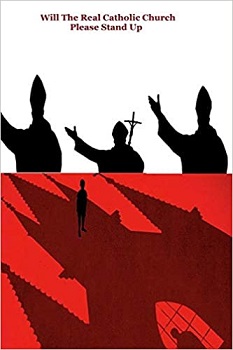









 Follow
Follow


